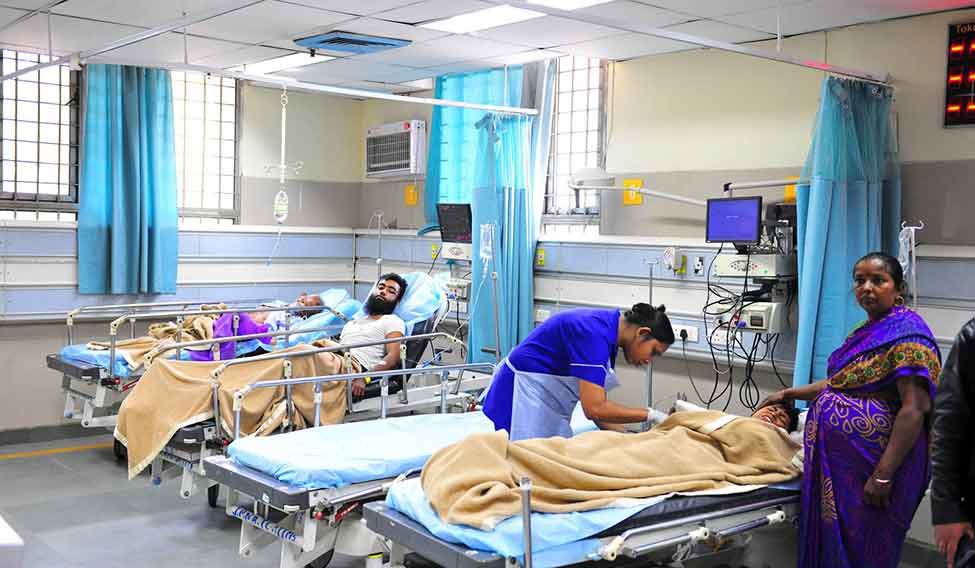The much-awaited National Medical Commission (NMC) Bill, introduced in the Lok Sabha on December 29, faced strong opposition from various sections of doctors, particularly on two issues: one, the proposed bridge course to allow AYUSH doctors to practice modern medicine, and two, a licentiate exam for MBBS graduates.
The bill, drafted by Niti Aayog before it was sent to the health ministry, was opposed by the Indian Medical Association on several grounds, including the "unscientific mixing of systems" via a bridge course. This course would lead to 'substandard doctors' and 'substandard medical practice,' claimed the IMA.
To push their 'concerns', IMA members lobbied with individual MPs right after the bill was introduced in the Lok Sabha by Health Minister J.P. Nadda.
The rationale behind the bridge course was to address shortage of doctors in rural areas, where MBBS graduates are 'unwilling' to go. But the clause did not go down well with several MPs including some of the ruling party's own.
Dr Sanjay Jaiswal, MP from Bihar, said he 'requested' Nadda to send the bill to the parliamentary standing committee, days after it was introduced. Jaiswal said, "If the intent is to increase the number of doctors, then why not utilise the nurse practitioners instead? Crosspathy is not a good idea. I agree that there are some good Ayurveda colleges, but I have also seen many traditional medicine colleges being run out of cowsheds!"
Dr Kirit Premjibhai Solanki, BJP MP from Gujarat, added that though the idea of the bill to replace the MCI with a new body was good, mixing modern medicine with AYUSH would only harm the patient's interests.
Among practitioners of modern medicine, several doctors that THE WEEK spoke to said that they were opposed to the idea of a bridge course in the NMC. The Indian Institute of Homeopathic Physicians also issued a statement, saying that they were opposed to this course that would open the "Pandora's box for creating quackery."
The idea of a bridge course, though, is not new. According to Dr Vanitha Muralikumar, president of the Central Council for Indian Medicine, Ministry of AYUSH, the module of a short course was proposed by the Council in 2014, based on a request from the health ministry to do so, in a bid to address shortages of doctors in rural areas.
The idea was to help states train Ayurveda doctors and nurses in emergency services and primary healthcare.
According to a notification by the health ministry, the programme for nurses has been rolled out in 11 states, and classes for the first batch of the Ayurveda practitioners commenced in September 2017. This course would train a pool of "mid level healthcare providers" to lead the ministry's health and wellness centres.
The course certificate is given by IGNOU, and according to Muralikumar, states, such as MP, Maharashtra and Jammu and Kashmir, have already adopted the course. Different states have separate policy for AYUSH doctors—while some such as Maharashtra allow them to practice modern medicine, others, such as Kerala and Tamil Nadu, do not allow.
According to Muralikumar, AYUSH doctors have been used in the National Rural Health Mission, and there has been a grievance that they are paid less than their MBBS counterparts.
The CCIM president said that despite the similarities in the curriculum of BAMS and MBBS—BAMS graduates also study subjects such as anatomy, physiology, forensic medicine and social and preventive medicine—there was a prevailing bias against them.
"We need a practical debate on the bridge course issue so that the line of limitation for AYUSH doctors vis-a-vis modern medicine can be drawn. But for that, there has to be acceptance and people need to shed their egos," she said.
A debate on the subject would also help fill gaps in Ayurveda such as anaesthesia and administering medicines like paracetamol or anti-hypertensive pills, she said. "A bridge course would also help us handle emergency cases better. Besides, Ayurveda doctors are not allowed to use ultrasound machines and several radiology devices. These are not the property of modern medicine; they are tools developed by engineers!" she said.
An official from the ministry of health and family welfare who did not want to be named said that since the ministry did not get enough time with the draft law, and did not engage its technical experts, fears of students and doctors regarding a licentiate exam, and the bridge course, could not be allayed.
"The MBBS doctors do not go to rural areas, but AYUSH doctors are ready to go for less money. So why not utilise them? Of course, if it was defined as to what kind of medicines can be prescribed, vested interest parties such as IMA would not have gotten a chance to scare the MBBS students," said the official.
Similarly, the official said that reservations around the licentiate exam, could have been addressed too. "The licentiate exam is not a good idea. Instead, there should be a common exit exam, but that should only be so that the college would maintain its quality. The exam should not be giving out licences," he said.
Jaiswal added that a licentiate exam on the pattern of USMLE would only create more shortages.
"Even if you keep a 30 percentile benchmark for the qualifying exam, you will be keeping out 30,000 doctors. No other profession such as engineering or law has this kind of an exam. So why in India? This licentiate exam would pitch an AIIMS graduate against one who has studied in China. That's not fair!" he said.
A common exit exam—possibly even the final year MBBS exam as proposed by the IMA—would be a better idea, said Jaiswal.
This exam would rule out the existing practices in certain colleges where the external examiner (during final year MBBS exams) is known to the internal examiner and would pass the student. "A centralised pool of examiners who would randomly visit colleges and test the MBBS graduates is a better idea," he said.





